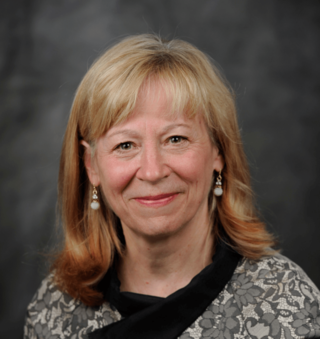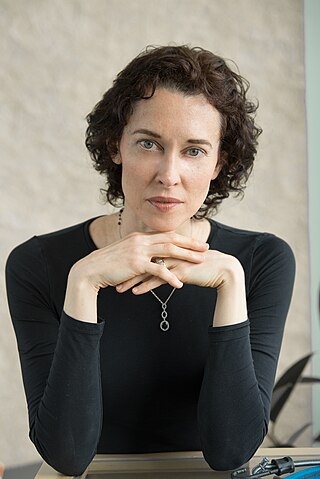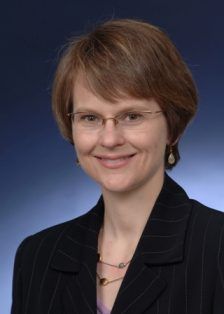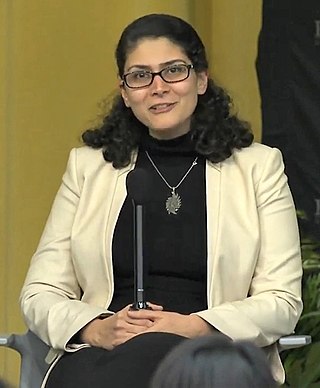Related Research Articles

Krzysztof "Kris" Matyjaszewski is a Polish-American chemist. He is the J.C. Warner Professor of the Natural Sciences at the Carnegie Mellon University Matyjaszewski is best known for the discovery of atom transfer radical polymerization (ATRP), a novel method of polymer synthesis that has revolutionized the way macromolecules are made.

Manuela Maria Veloso is the Head of J.P. Morgan AI Research & Herbert A. Simon University Professor Emeritus in the School of Computer Science at Carnegie Mellon University, where she was previously Head of the Machine Learning Department. She served as president of Association for the Advancement of Artificial Intelligence (AAAI) until 2014, and the co-founder and a Past President of the RoboCup Federation. She is a fellow of AAAI, Institute of Electrical and Electronics Engineers (IEEE), American Association for the Advancement of Science (AAAS), and Association for Computing Machinery (ACM). She is an international expert in artificial intelligence and robotics.

Flubber, Glorp, Glurch, or Slime is a rubbery polymer formed by cross-linking of polyvinyl alcohol (PVA) with a borate compound. Slime can be made by combining polyvinyl-acetate-based adhesives with borax.
Robert Byron Bird was an American chemical engineer and professor emeritus in the department of chemical engineering at the University of Wisconsin-Madison. He was known for his research in transport phenomena of non-Newtonian fluids, including fluid dynamics of polymers, polymer kinetic theory, and rheology. He, along with Warren E. Stewart and Edwin N. Lightfoot, was an author of the classic textbook Transport Phenomena. Bird was a recipient of the National Medal of Science in 1987.

Geraldine Lee Richmond is an American chemist and physical chemist who is serving as the Under Secretary of Energy for Science in the US Department of Energy. Richmond was confirmed to her DOE role by the United States Senate on November 5, 2021. Richmond is the Presidential Chair in Science and professor of chemistry at the University of Oregon (UO). She conducts fundamental research to understand the chemistry and physics of complex surfaces and interfaces. These understandings are most relevant to energy production, atmospheric chemistry and remediation of the environment. Throughout her career she has worked to increase the number and success of women scientists in the U.S. and in many developing countries in Africa, Asia and South America. Richmond has served as president of the American Association for the Advancement of Science, and she received the 2013 National Medal of Science.

Helen Jane Wilson,, is a British mathematician and the first female Head of Mathematics at University College London (UCL).
Ashish Kishore Lele is an Indian chemical engineer, rheologist and the Director of the National Chemical Laboratory, Pune. He is known for his researches on micro and mesostructure of polymers and is an elected fellow of the Indian Academy of Sciences, and the Indian National Academy of Engineering. The Council of Scientific and Industrial Research, the apex agency of the Government of India for scientific research, awarded him the Shanti Swarup Bhatnagar Prize for Science and Technology, one of the highest Indian science awards for his contributions to Engineering Sciences in 2006. He received the Infosys Prize in 2012.
Alan Jeffrey Giacomin is a professor of chemical engineering at Queen's University in Kingston, Ontario, and cross-appointed in the Department of Mechanical & Materials Engineering, and of Physics, Engineering Physics, and Astronomy. He has been editor-in-chief of Physics of Fluids since 2016. He holds the Tier 1 Canada Research Chair in Rheology from the Canadian government's Natural Sciences and Engineering Research Council. Since 2017, Giacomin has been President of the Canadian Society of Rheology.

Jennifer Hartt Elisseeff is an American biomedical engineer, ophthalmologist and academic. She is the Morton Goldberg Professor and Director of the Translational Tissue Engineering Center at Johns Hopkins Department of Biomedical Engineering and the Wilmer Eye Institute with appointments in Chemical Engineering, Biomedical Engineering, Materials Science and Orthopedic Surgery. Elisseeff's research is in the fields of regenerative medicine and immunoengineering.

Kathryn L. Beers is an American polymer chemist. Beers is Leader of the Polymers and Complex Fluids group in the Materials Science and Engineering Division at the National Institute of Standards and Technology. Her research interests include microreactors and microfluidics, advances in polymer synthesis and reaction monitoring, macromolecular separations, integrated and high throughput measurements of polymeric materials, degradable and renewable polymeric materials, and sustainable materials.
Gareth Huw McKinley is Professor of Teaching Innovation in the Department of Mechanical Engineering at Massachusetts Institute of Technology (MIT).
Ronald G. Larson is George G. Brown Professor of Chemical Engineering and Alfred H. White Distinguished University Professor at the University of Michigan, where he holds joint appointments in macromolecular science and engineering, biomedical engineering, and mechanical engineering. He is internationally recognized for his research contributions to the fields of polymer physics and complex fluid rheology, especially in the development of theory and computational simulations. Notably, Larson and collaborators discovered new types of viscoelastic instabilities for polymer molecules and developed predictive theories for their flow behavior. He has written numerous scientific papers and two books on these subjects, including a 1998 textbook, “The Structure and Rheology of Complex Fluids”.
Surita Bhatia is an American chemist who is professor and vice provost of faculty affairs at Stony Brook University. Her work considers the structure of soft materials, including polymeric hydrogels and colloidal glasses. She was elected Fellow of the American Institute of Chemical Engineers, the American Institute for Medical and Biological Engineering and the Society of Rheology in 2020.
Sara A. Majetich is an American physicist and Professor of Physics at Carnegie Mellon University. Her work considers magnetic nanoparticles and nanostructures for application in spintronic devices. She is a Fellow of the American Physical Society and the Institute of Electrical and Electronics Engineers.

Rachel (Raya) Takserman-Krozer was a theoretical physicist and professor of rheology. Takserman-Krozer worked on diverse aspects of theoretical physics ranging from theory of relativity to studies of polymers and their flow. Her scientific work includes contributions to behaviour of polymers and polymers solutions in velocity fields, theory of spinnability, problems of phenomenological rheology, and molecular-statistical theory of polymer networks. Takserman-Krozer worked across several countries including Russia, Poland, Israel, and Germany.
Morton Mace Denn is a rheologist, chemical engineer, and the Albert Einstein Professor Emeritus of Science and Engineering at the City College of New York. He is a member of the National Academy of Engineering, a Fellow of the American Academy of Arts and Sciences, and winner of a Fulbright Lectureship award, Guggenheim Fellowship, and the Bingham Medal. He previously taught at the University of Delaware and the University of California, Berkeley and was the director of the Benjamin Levich Institute for Physicochemical Hydrodynamics from 2001 to 2015. He was also a program leader at Lawrence Berkeley National Laboratory for 16 years.

Lilo Danielle Pozzo is an American chemical engineer who is a professor of chemical engineering at the University of Washington. Her research considers the development, measurement and control of molecular self-assembly. She is interested in the realization of materials for energy storage and conversion. Pozzo serves on the editorial board of the Royal Society of Chemistry journal Digital Discovery.
Kathryn Ann Whitehead is an American chemical engineer who is a professor at Carnegie Mellon University. Her research considers the development of nanomaterial-based drug delivery systems for gene therapy, oral macromolecular delivery systems, and maternal and infant therapeutics. She is an elected Fellow of the American Institute for Medical and Biological Engineering in 2021 and Fellow of the Controlled Release Society.
Shelley Lynn Anna is an American chemical engineer and experimental fluid dynamics researcher who studies droplets, multiphase flow, and the effects of surfactants in microfluidics, the rheology of extensional and interfacial flows, and microscale transport. She is a professor of chemical engineering and associate dean for faculty and graduate affairs and strategic initiatives in the Carnegie Mellon University College of Engineering.

Arezoo M. Ardekani is an Iranian-American physicist who is a professor at Purdue University. Her research considers the flow of complex fluids. She was elected a Fellow of the American Society of Mechanical Engineers in 2020 and a Fellow of the American Physical Society in 2022.
References
- 1 2 3 4 5 "Lynn M. Walker - Fellow, Elected 2017 - The Society of Rheology". www.rheology.org. Retrieved 2022-03-07.
- ↑ "Lynn Walker". engineering.cmu.edu. Retrieved 2022-03-07.
- ↑ "CBE Centennial Seminar - Lynn Walker, Carnegie Mellon University". University of Delaware. Retrieved 2022-03-07.
- ↑ Smith, Lauren (2023-08-16). "A farewell and thank you to Lynn Walker". Dept Chem Eng, CMU. Retrieved 2024-08-23.
- ↑ "Women in Chemical Engineering (WIC) Mentorship Excellence Award". www.aiche.org. 2012-03-28. Retrieved 2022-03-07.
- ↑ University, Carnegie Mellon. "Celebration of Education Awards - The Piper - Carnegie Mellon University". www.cmu.edu. Retrieved 2022-03-07.
- ↑ "Fellows nominated in 2022". APS Fellows archive. American Physical Society. Retrieved 2022-10-19.